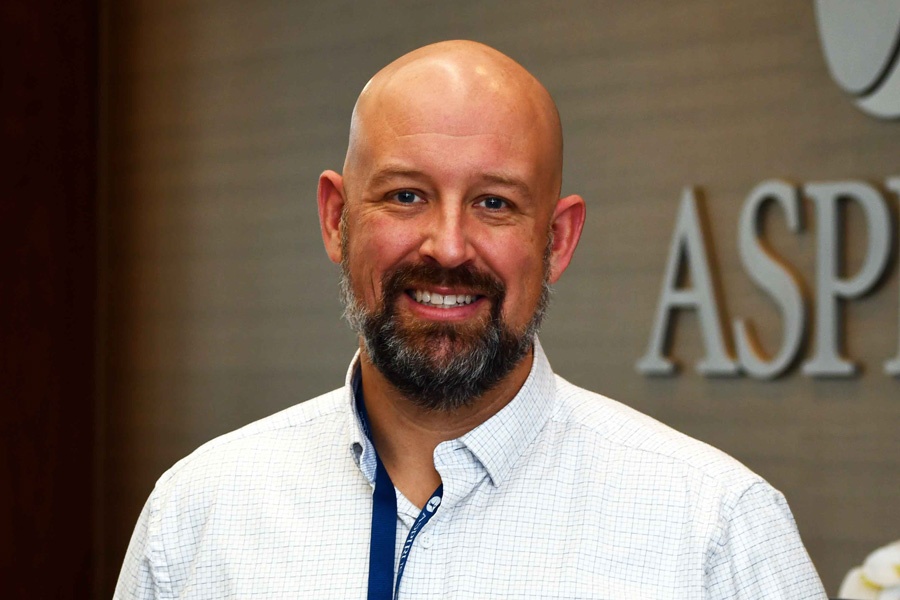What is your current role in health care?
“I am truly a “jack of all trades” executive. My title is SVP; President, Regional Markets at Aspirus Health. I am accountable for operations outside of our tertiary location/central region. Right now, we have 17 hospitals, 75+ clinics and a whole host of other services. Aspirus is truly an Integrated Delivery Network. At Aspirus, I have taken on many “other duties as assigned” including Covid EOC Incident Commander as we started our Covid Journey, tertiary hospital President, and most recently the Executive Sponsor for integrating about 3,000 employees, 7 new hospitals, 21 clinics and an EMS division. This integration added about 30% to our organization and has required moving all over to our Electronic Medical Record.”
What stands out as a favorite memory during your time as an MHA student?
“Early in our program, I was invited to meet with a group of second year students to start a program called CLARION. I liked what it was all about and jumped in. I was the treasurer and member of our executive leadership team. We spent many extra hours with our faculty advisors over at Moos or Carlson. I was fortunate enough to be able to find some good funding for our very first interprofessional case competition (one of the first in the nation) and was pleased to watch the group flourish and grow!”
How has the MHA Program helped prepare you for your career?
“The MHA Program helped prepare me for the future by teaching me to think critically about a wide variety of issues. My day is packed with meetings from 7am to 7pm and I I am involved in a variety of topics spanning the entire curriculum of the MHA program. It also taught me to think about the impacts of decisions on other parts of the system. Most important for me though, was the ability to interact with other health professionals across the campus. Every single day, I am working with nurses, pharmacists, physicians, IT professionals, lawyers, you name it. Having the ability to relate to people, articulatean issue (problem statement), understand options (alternative solutions) and make the best decisions is an everyday occurrence for me. I may not have the luxury of taking a semester to work on a problem-solving case, but the concepts remain ingrained in my approach.”
What challenges and opportunities will healthcare leaders encounter in the next 5-15 years? What skills will leaders need to be successful in light of these challenges and opportunities?
“I think as healthcare leaders, we will have many of the same challenges previous leaders had, they just take on different context or definition. I remember my first day in the program when we had a panel of executives talking about life as an MHA student and future alum. An alumni had graduated from the program in the 50s and said “We had missed the golden age of healthcare administration and that it was going to be tough work”. I disagree with his first part, but agree with the second. As MHA’ers, we will need to help healthcare continue to transition. We need to take the tolls available to us and transform and integrate them into healthcare to improve cost, quality, satisfaction, and outcomes. Maybe we can’t recruit registration staff as readily; how can technology be more widely used to have patients help us with this before they arrive in clinics? We can’t recruit specialists to rural markets and they don’t want to spend time on “windshield time”; can virtual reality recreate a visit for the provider and patient although in distant locations? Our backend authorization and payment process requires significant human intervention (and cost); how can we use the Epic system to handle prior-authorization and subsequent billing with fewer steps? I think the list could go on and on. If we as executives can take waste out of the system and allow more patient to provider time, we will have made an impact.
I believe that leaders need to develop and refine skills required in the Minnesota Way. The Problem Solving process is tried and true. Utilizing problem identification, stakeholder analysis, active listening, critical-thinking, problem identification, solution identification and ultimately implementation will serve leaders well. Leaders need to be adaptable and willing to take what comes their way. Leaders also need to be resilient. With the challenges of today and the challenges of tomorrow, a steady guiding personality helps ensure that progress is made versus a bunch of folks spinning their wheels or all going in different directions.”
If you could give one piece of advice to a current student, what would it be?
“My advice to students is to “soak it all in”. Recognize that the next few years (including a fellowship) allow you to think about your career in healthcare administration in ways that you might not be able to again. Take some “risks” by exploring things you don’t know about or maybe aren’t even sure you will like. Exploration of new topics or areas of discomfort, might be your next new passion. You never know what you might discover.”
Why is your class the best class ever?
“As a small class, we were generally very close. We were also at Carlson, so we were unique in that we were focused on healthcare in a sea of business students. Those connections were certainly solidified through our shared course work. To this day, many of our classmates talk on a regular basis. In the last six months, I have seen or talked to about half of my class. That is pretty much something only the Best Class Ever could pull off!”

